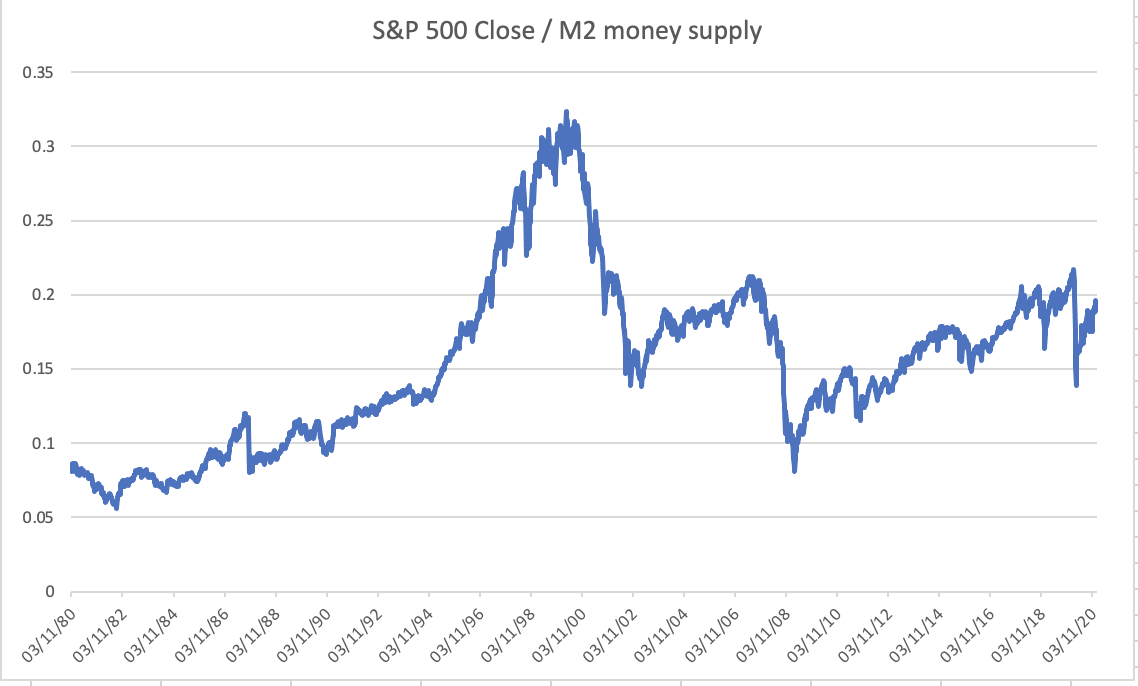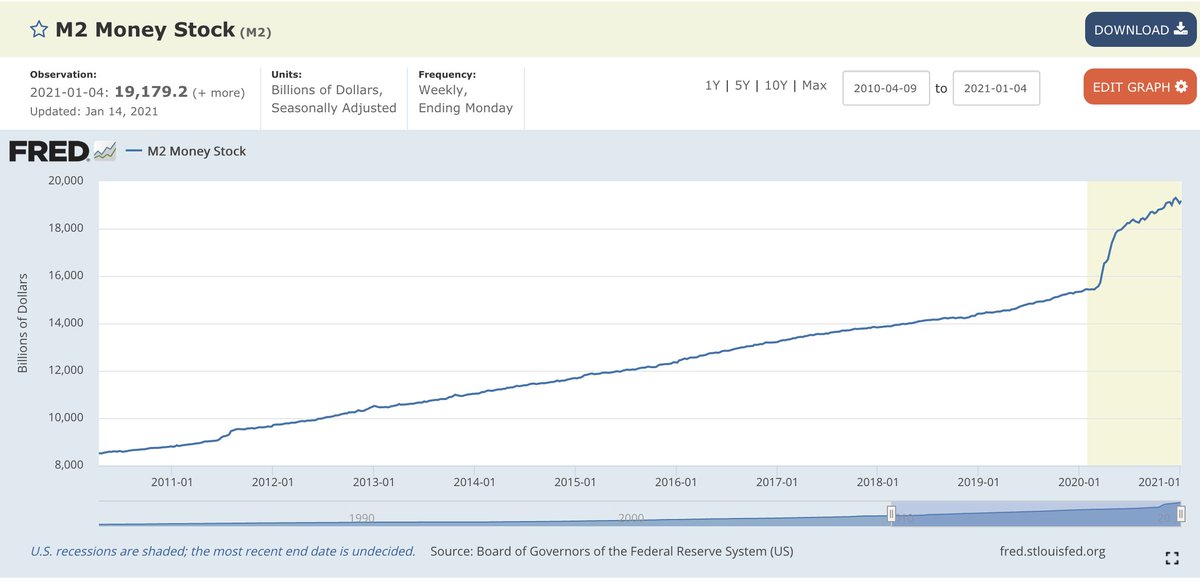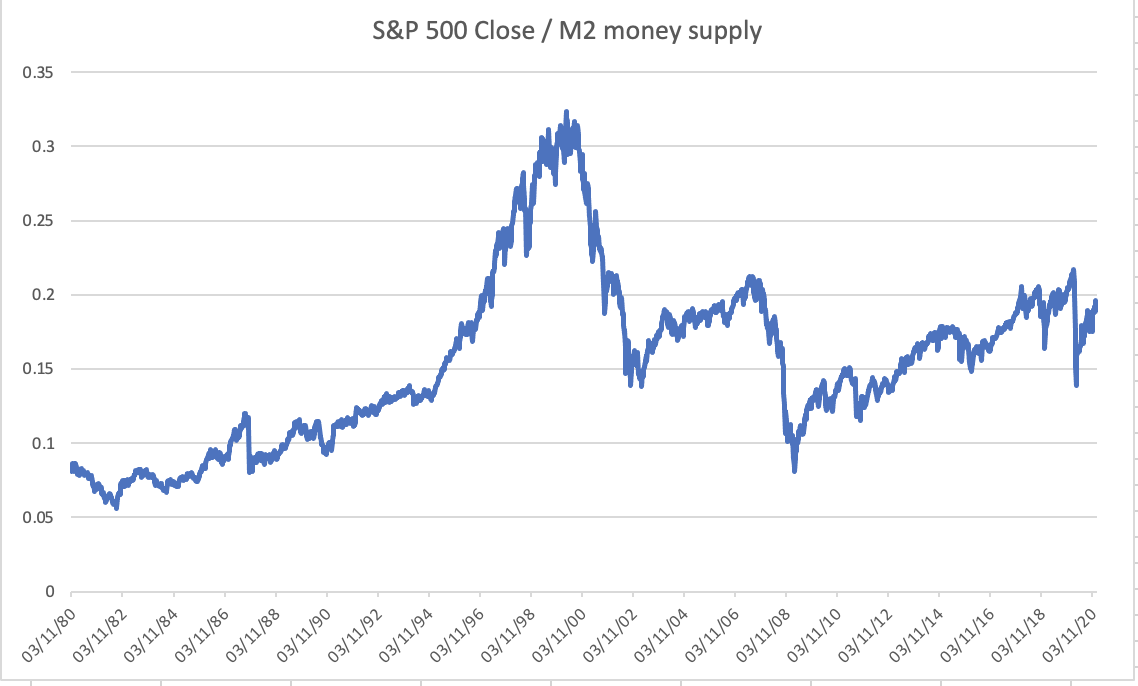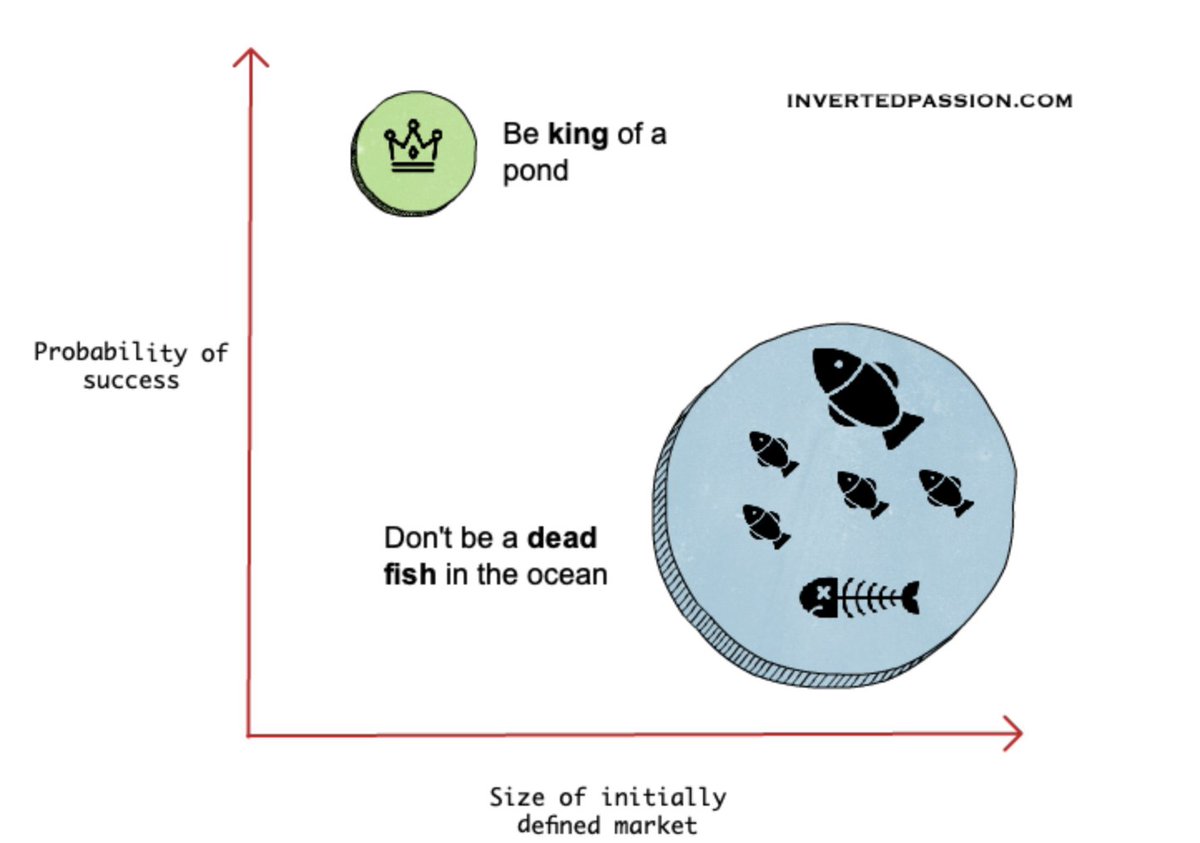
Most surgeries are ineffective!
(a short thread on this bold claim)
🔥 It's also my 2nd podcast episode
(a short thread on this bold claim)
🔥 It's also my 2nd podcast episode
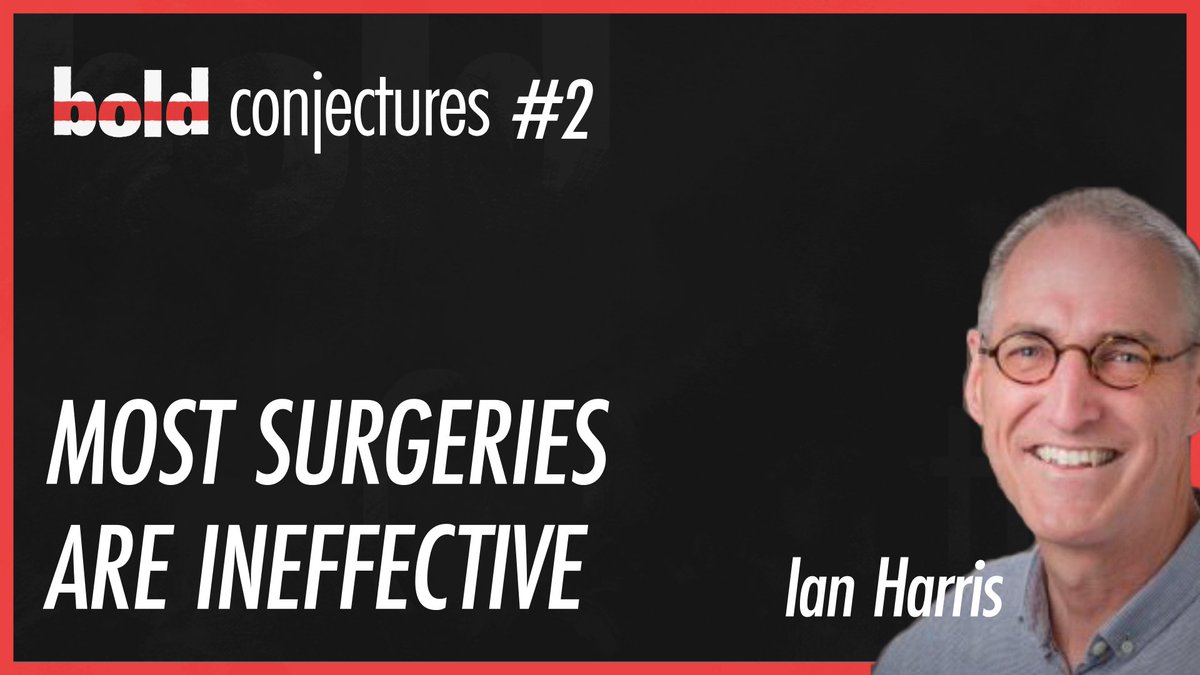
1/ For my 2nd episode, I interviewed @drianharris who is a practicing orthopedic surgeon and a professor of surgery.
He researches how effective commonly performed surgeries are, and his results are surprising.
The entire episode is worth watching:
He researches how effective commonly performed surgeries are, and his results are surprising.
The entire episode is worth watching:
2/ Here's what we talk about in the podcast.
My notes from the conversation are below in the thread, so keep reading...
My notes from the conversation are below in the thread, so keep reading...
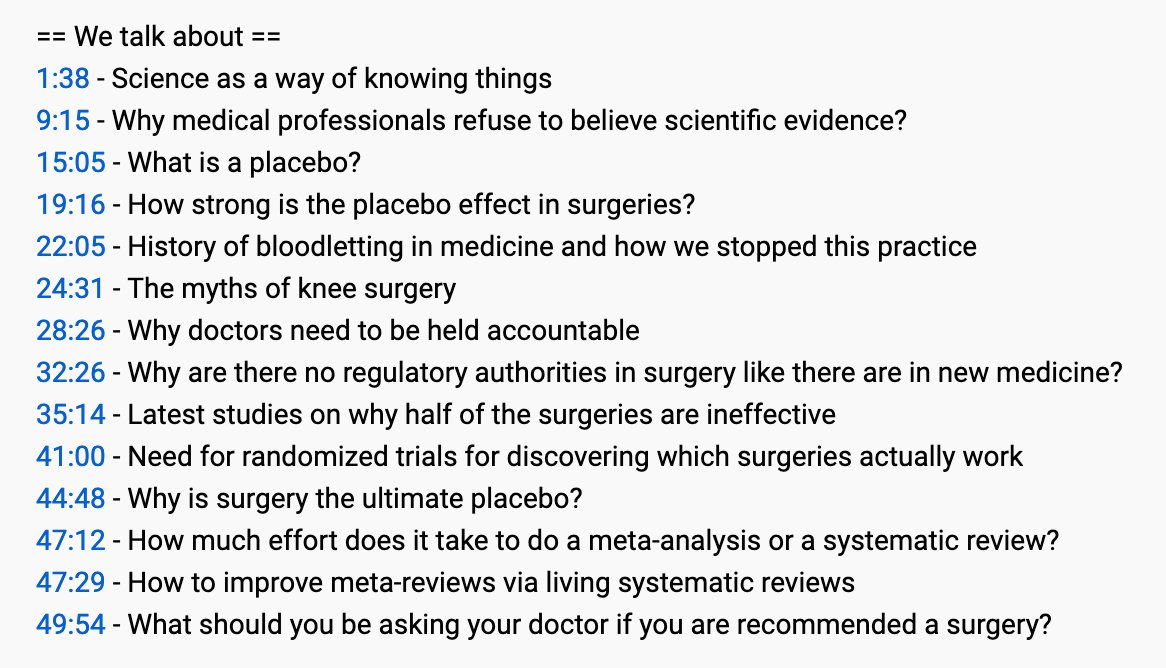
3/ What is a placebo surgery?
It’s where you make an incision but not do anything.
It’s analogous to traditional placebo in medicine, where a sugar or salt pill is given instead of an active chemical to see whether the intended medicine has an actual impact.
It’s where you make an incision but not do anything.
It’s analogous to traditional placebo in medicine, where a sugar or salt pill is given instead of an active chemical to see whether the intended medicine has an actual impact.
4/ Majority of surgeries that @DrIanHarris and other researchers have studied in fact are not more effective than placebos.
This is shocking because even when we have no proof that they work, many of these surgeries are happening even today.
This is shocking because even when we have no proof that they work, many of these surgeries are happening even today.
5/ Examples of such ineffective surgeries include back pain surgeries and knee pain surgeries
For such surgeries, randomized control trials have found that if you make an incision in the knee but don’t do anything, it’s as effective as actually conducting the surgery of the knee
For such surgeries, randomized control trials have found that if you make an incision in the knee but don’t do anything, it’s as effective as actually conducting the surgery of the knee
6/ Why do patients get better if the surgery doesn’t work?
It’s because many diseases or pain have a natural progression, and we generally seek surgical/medicinal intervention when we’re in the worst condition.
It’s because many diseases or pain have a natural progression, and we generally seek surgical/medicinal intervention when we’re in the worst condition.
7/ If the body heals / condition becomes better after that, we attribute improvement to the intervention rather than thinking it could have happened anyway (due to the natural course of the condition).
8/ As @DrIanHarris said in the podcast, the unsaid attitude could be stated like:
“you have to operate on patients quickly before they get better“.
Remember: in many cases, if you get sick, you get better after that.
And that is why placebos seem to work.
“you have to operate on patients quickly before they get better“.
Remember: in many cases, if you get sick, you get better after that.
And that is why placebos seem to work.
9/ It’s shocking to hear that randomized controlled trials (RCT) for many surgical interventions end up finding that they’re ineffective.
But what’s most shocking is that many other interventions have never been subjected to an RCT against a placebo.
But what’s most shocking is that many other interventions have never been subjected to an RCT against a placebo.
10/ For many of the common procedures traditionally practiced, we don’t know whether they work at all or not.
Sad, but true.
Sad, but true.
11/ For sure, there are many studies that study variations of surgical methods. That is, they try to find out whether an incision from the left is better or from the right.
But very few studies try to find out whether the incision does anything at all for the patient.
But very few studies try to find out whether the incision does anything at all for the patient.
12/ In that sense, surgery is different than medicine.
All new pharmaceutical molecules are subjected to rigorous clinical trials where they're tested against placebo or doing nothing.
In many countries, there's no such procedure for surgical treatments.
All new pharmaceutical molecules are subjected to rigorous clinical trials where they're tested against placebo or doing nothing.
In many countries, there's no such procedure for surgical treatments.
13/ If there is a procedure for new surgical procedures, nobody is testing old ones that have been getting performed every day without evidence.
14/ If research indicates many of the currently practiced surgeries don’t work, why are they still practiced?
Well, and here's the key point ->
If your salary depends on not believing something, you won’t believe it.
This holds for everyone, including doctors and surgeons.
Well, and here's the key point ->
If your salary depends on not believing something, you won’t believe it.
This holds for everyone, including doctors and surgeons.
15/ And such denial is not new.
The most common surgical procedure in history was bloodletting.
This practice which lasted for thousands of years was only questioned in mid 19th century, and even after randomized trials showed that it hurt the patient, it wasn’t abandoned.
The most common surgical procedure in history was bloodletting.
This practice which lasted for thousands of years was only questioned in mid 19th century, and even after randomized trials showed that it hurt the patient, it wasn’t abandoned.
16/ It died a slow death as its practitioners started dying.
Even today, the fact that practices like Homeopathy survive suggests that seeking evidence of what works isn’t a big priority for society. Perhaps keeping traditions is a bigger priority.
Even today, the fact that practices like Homeopathy survive suggests that seeking evidence of what works isn’t a big priority for society. Perhaps keeping traditions is a bigger priority.
17/ But because it’s costly and risky to perform surgeries, the urgent question is: what surgical procedures are today’s equivalent of bloodletting?
And those that we know are bloodletting, how do we get rid of them as a society?
And those that we know are bloodletting, how do we get rid of them as a society?
18/ As a patient, what should you do?
Dr Ian Harris recommends that every time your doctor recommends a medical procedure, ALWAYS ask for risks and benefits.
Dr Ian Harris recommends that every time your doctor recommends a medical procedure, ALWAYS ask for risks and benefits.
19/ Risks are a given and doctors generally are happy to talk about them.
But nobody asks for benefits because they’re assumed to be there.
Ask and confirm about benefits explicitly.
But nobody asks for benefits because they’re assumed to be there.
Ask and confirm about benefits explicitly.
20/ What if the pain isn’t going away at all? Should you then get surgery?
Golden advice by Dr Ian -> “the severity of your symptoms does not change the effectiveness of the operation“
Golden advice by Dr Ian -> “the severity of your symptoms does not change the effectiveness of the operation“
21/ That's it! Hope you enjoyed the podcast
Resources to dive further into this research is on my blog.
PS: If you make notes from the podcast, tag me and I'll RT.
invertedpassion.com/most-surgeries…
Resources to dive further into this research is on my blog.
PS: If you make notes from the podcast, tag me and I'll RT.
invertedpassion.com/most-surgeries…
22/ Here's a relevant paper for those who don't believe this.
bmj.com/content/348/bm…
In half of the studies, the results provide evidence AGAINST continued use of the investigated surgical procedures.
bmj.com/content/348/bm…
In half of the studies, the results provide evidence AGAINST continued use of the investigated surgical procedures.
• • •
Missing some Tweet in this thread? You can try to
force a refresh

